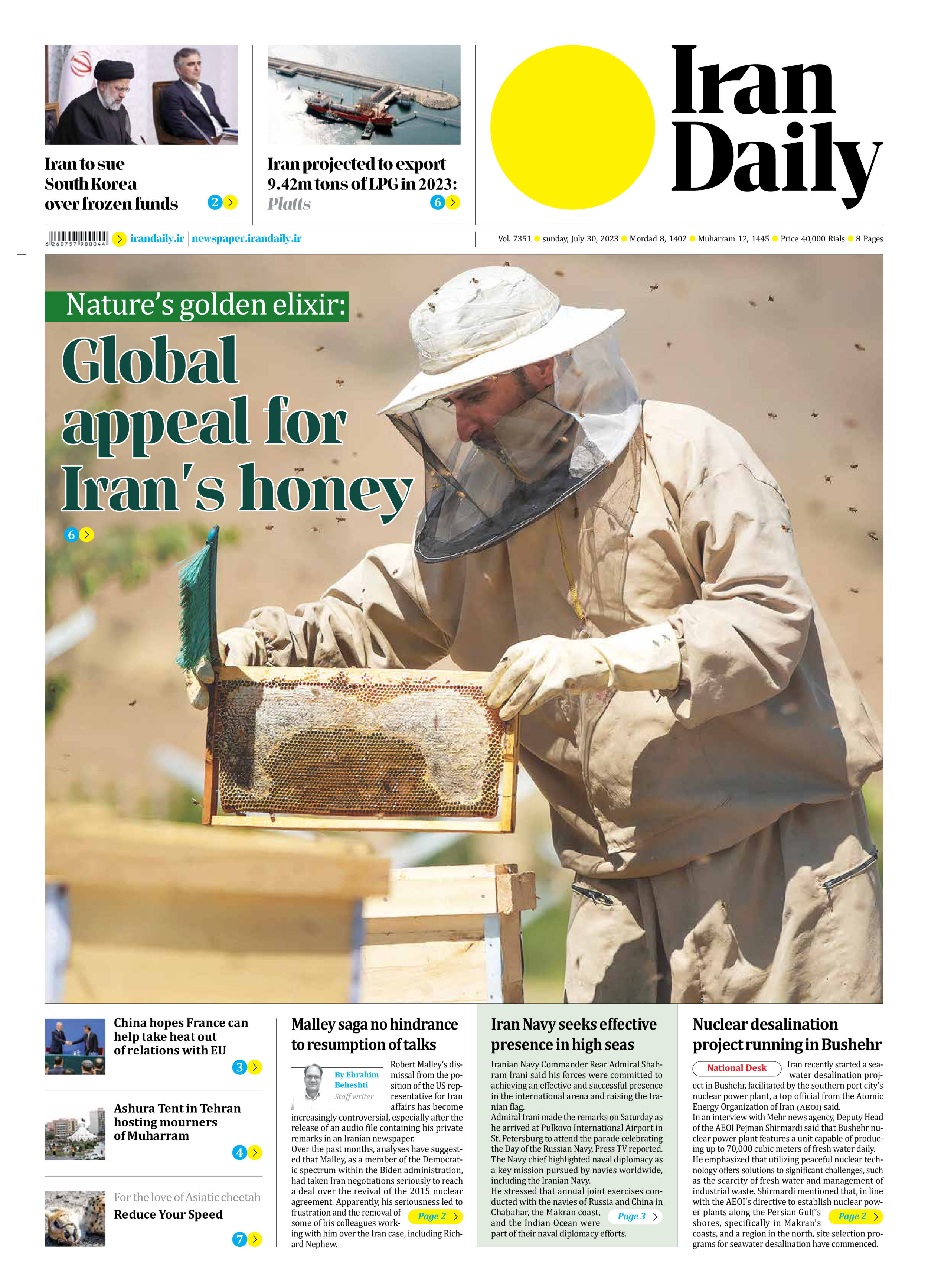
Malley saga no hindrance to resumption of talks
By Ebrahim Beheshti
Staff writer
Robert Malley’s dismissal from the position of the US representative for Iran affairs has become increasingly controversial, especially after the release of an audio file containing his private remarks in an Iranian newspaper.
Over the past months, analyses have suggested that Malley, as a member of the Democratic spectrum within the Biden administration, had taken Iran negotiations seriously to reach a deal over the revival of the 2015 nuclear
agreement. Apparently, his seriousness led to frustration and the removal of some of his colleagues working with him over the Iran case, including Richard Nephew.
Malley had discussions with Iranian representatives in Oman, Qatar, and New York. It is undisputed that he represented the US administration and made every effort in his negotiations to preserve or gain more concessions for the United States. Similarly, Iranian representatives also pursued the same principle of seeking greater concessions, and this very approach might be one of the reasons for the protracted negotiations.
However, the specifics behind Malley’s dismissal are not clear, and it is uncertain who might benefit from his removal or whether it is a set-up against him, as some media outlets have suggested.
Despite Iran’s focus on developing relations with China and Russia, the Islamic Republic has not neglected resolving its disputes with the West. The Iranian government engaged in several rounds of negotiations with Western counterparts to lift sanctions and even conducted talks for prisoner exchanges.
In recent months, discussions between Iranian and American delegations have taken place in Oman, Qatar, and even New York. Consequently, it is natural for the Iranian government, who had been committed to the negotiation process, not to be pleased with any halt or failure to achieve results. Emphasizing a principled framework to safeguard interests does not imply opposition to negotiations or a lack of willingness to reach a conclusion.
On the other hand, the US administration, despite facing pressure from Republican rivals over negotiating with Iran, considers reaching an agreement with Iran a significant achievement, particularly due to the severe criticism of Trump’s policies toward the Iran nuclear deal during Biden’s election campaign. US officials currently view Trump’s withdrawal from the JCPOA as a mistake.
Any agreement with Iran, regardless of its specifics, would be beneficial for Americans, providing them with a better opportunity to focus their efforts on traditional competition with China and managing the situation in Ukraine. It seems that these very considerations have led them not to display a negative reaction toward the Iran-Saudi Arabia agreement and their regional détente.
The diplomatic negotiations over the past few months between Iran and some regional countries such as Oman and Qatar indicate that Tehran and Washington are on a path to easing tensions and resolving disputes. While normalizing relations between the two countries, if there is a willingness for it, may have a long way to go, both sides have preferred to prevent further escalations in line with their national interests.
In this context, there were talks about reaching a temporary understanding between Iran and the United States with the goal of initially managing the existing tensions, in order to prevent their exacerbation. This temporary agreement could potentially pave the way for more comprehensive talks to clinch a more sustainable deal in the future.
In the midst of these negotiations, it appears that certain third parties, such as Israel, do not want to see any management or control of tensions between Iran and the US. These parties prefer that the US remains preoccupied with their issues rather than focusing on them. For example, despite strategic relations with Israel, the US has criticized Benjamin Netanyahu’s hardline policies. Other states also view American attention on Iran as beneficial for their military or economic rivalry with Washington.
In addition to these negative influences from external actors, there are political factions within the US and Iran that are not interested in mitigating tensions through dialogue for various reasons. It is clear that Republicans in the US oppose any agreements Democrats make with Iran. Moreover, Israeli lobbies and the limited influence of the Iranian opposition in the US political landscape may also play destructive roles in relation to Iran-US relationship.
Therefore, any blow to diplomacy, as a reasonable option for managing tensions and a means to lift sanctions, will be welcomed by states or powerhouses that perceive their interests in the continuation or escalation of tensions between Tehran and Washington.
Recent media controversies surrounding Malley might help the opponents of managing Iran-US tensions and the resumption of negotiations to revive the JCPOA and lift sanctions. Nevertheless, what truly matters are the official positions of the governments involved, not media evaluations or analyses.
Although there are ambiguities and doubts about how this confidential audio file was leaked, there is a clear distinction between media positions and official government stances. Thus, it does not seem that such peripheral issues would seriously hinder the resumption of Iran-US talks.







